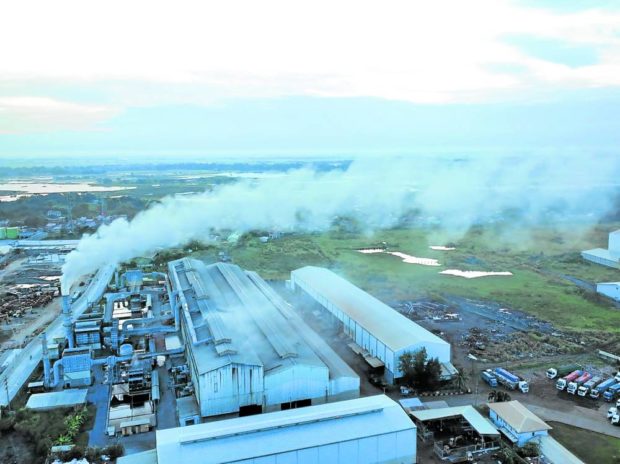Pampanga town first in PH to ban steel plant polluting equipment

ALARM IN THE AIR | Residents of San Simon town in Pampanga provided this photo taken on Jan. 27, 2023, showing a local steel manufacturing plant emitting smoke that allegedly causes respiratory problems among nearby villagers and the quick corrosion of their roofs. (CONTRIBUTED PHOTO)
CITY OF SAN FERNANDO, Pampanga, Philippines — The San Simon municipal government in Pampanga province has banned the use of induction furnaces (IF) in the smelting of metal scraps in the town following reports of respiratory illnesses among residents and easily rusting roofs in at least five villages near these steel plants.
The ban was included in the final version of Ordinance No. 003, also called the “Strengthening the Modernization of Smelting Metal Scrap Ordinance,” which was unanimously approved by the municipal council on Feb. 13.
Mayor Abundio Punsalan Jr. signed the ordinance on Thursday, according to Vice Mayor Romanoel Santos, the council’s presiding officer.
This made San Simon the first town in the country to have legislated a ban on induction furnaces.
The five steel bar manufacturers operating in the town were given two years to upgrade their equipment, but were also offered “incentives” from the local government should they comply.
Article continues after this advertisementUnder Section 13 of the ordinance, the companies that will modernize their facilities and put antipollution safeguards in place will get a discount in business tax payments for three years and another discount on their real property tax and other regulatory fees imposed by the municipality, also for three years.
Article continues after this advertisementThe mayor was expected to create a technical working group to draft the implementing rules and regulations (IRR) of Ordinance No. 003 within two months, Santos said.
But Punsalan, in an interview here on Friday, said the IRR would only be “ready after two years when the grace period of two years is over.” The local law defined IF as “an electrical furnace in which the heat is applied by induction heating of metal.”
According to the minutes of a hearing conducted by the town council on Jan. 18, three of the local steel manufacturers— Melters Steel Corp., Real Steel Corp., and Wan Chiong Steel Corp. — reported using IF in smelting scrap metals. The two others —Altima Empire Steel Corp. and SKK Steel Corp.—use electric arc furnaces.
Residents’ complaints
The five companies produce an average of 3,000 tons of steel bars daily, according to an industry source.
In January, personnel from the Environmental Management Bureau (EMB) of the Department of Environment and Natural Resources in Central Luzon inspected the Wan Chiong and Melters plants in response to a formal complaint lodged by nearby residents, who said they had been suffering from respiratory problems due to the foul smoke emitted by the plants.
They also complained that the roofs of the houses and other structures in their villages were rusting away quite easily, again because of the air quality.
The EMB has yet to release the results of the air and water tests conducted in the affected areas.
The five companies have yet to respond to media queries as of this writing. According to the municipal council secretary, George Cariño, they did not register any formal objection to the passage of the ordinance.
Santos earlier said not all of the companies had updated their environmental clearance certificates.
“This is why the number of their pollution control device (PCD) are not in proportion to the number of their smelting their machines,” he said. “Most of them do not have continuous emission monitoring system and they need to have reserved PCD for contigency situations.”
A PCD costs around P50 million, said an industry source.